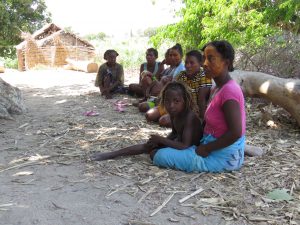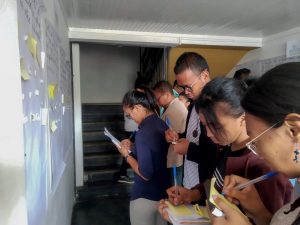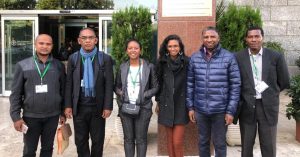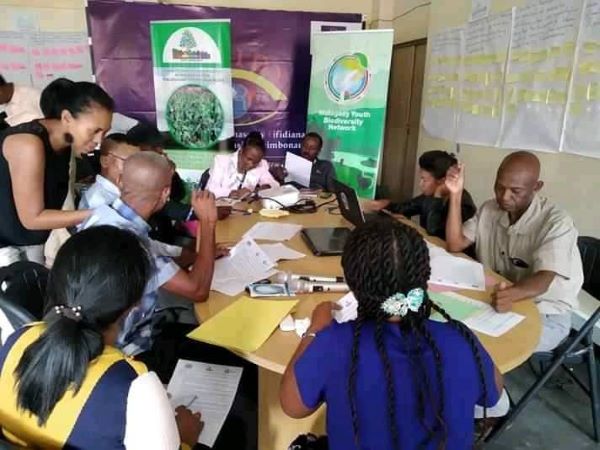First published on 02/19/2020, and last updated on 07/19/2022
By Mihanta Tsiorisoa Bakoliarimisa, Chair of the Policy and Programme Committee of the ICCA Consortium and technical secretary of TAFO MIHAAVO, ICCA Consortium Member.
In Madagascar, our Member TAFO MIHAAVO and Malagasy Youth Biodiversity Network have united to gather Fokonolona and youth to analyse the current biodiversity governance and management in the island, and to shape a common future to preserve biodiversity.
Fokonolona – or local communities – and youth are two interest groups that are often marginalized when it comes to biodiversity governance.
However, they are also key players because of their cultural and socio-economic relationship with nature. Indeed, Fokonolona have already taken on their responsibilities regarding conservation, in order to bequeath a preserved environment to future generations. They undertake these responsibilities, which derive from their rights and obligations, and are intimately linked to the existing legal framework, including international conventions such as the Convention on Biological Diversity and its protocols. In Madagascar, its implementation is reflected in a National Biodiversity Strategy and Action Plan.
Convinced that they have a say, TAFO MIHAAVO and Malagasy Youth Biodiversity Network have united their voices to express their views and to plead the case of present and future generations.
Bringing youth and Fokonolona together to shape a common future and preserve biodiversity in Madagascar
To this end, from 17-18 February 2020, a national consultation workshop was co-organised with the support of the ICCA Consortium and SwedBio to demonstrate this positive interaction between Fokonolona and youth and to reflect on their visions of the common future of Malagasy unique biodiversity. As the African proverb goes, « Youth can run fast but the elders know the road », combining the strengths of the youth and the expertise of local community elders will take us a long way!
Thirty-one TAFO MIHAAVO representatives from local communities and from the national and regional technical secretariat, representing twenty different regions, as well as twenty youth representatives participated.
It was the first meeting of TAFO MIHAAVO member communities this year, and was therefore a gathering rich in debate and sharing of experiences on the challenges of everyday life. Indeed, Madagascar not only has an impressive biological diversity, but also cultural and social singularities specific to each region.

Women group from Ambohimahavelona © TAFO MIHAAVO.
It was not always easy to facilitate discussions during the workshop and to reach a joint resolution! Therefore, local communities and youth discussed separately and then came back with their own resolutions, which in the end revealed similarities, complementarities, and specificities.
During these discussions, the participants have analyzed the zero-draft of the Post-2020 Global Biodiversity Framework. This exercise made it possible to identify the priority causes advocated by these two interest groups. Although these groups are different in nature and interest, common priorities have emerged and have made it possible to shape the vision of a common future, to preserve Madagascar’s biodiversity through the generations.
Analyzing together current biodiversity governance and management in Madagascar
The discussions focused on the three types of ecosystems found on the big island and for which TAFO MIHAAVO members are the guardian communities, according to de jure or de facto management mandates. These are forest ecosystems, inland waters, and marine and coastal ecosystems.
The methodology adopted during the consultation was developed by the national chapter of the Global Youth Biodiversity Network and is based on a participatory and iterative approach.

Collective and participatory discussion on interactive boards © Masy Miary Razafindrakoto.
A first analysis focused on the current context of biodiversity governance and management with the help of an interactive board through which participants were able to freely express their views on:
- the causes that limit the sustainable management of biodiversity in the three different types of ecosystems;
- the priority actions to undertake to ensure the sustainable management of biodiversity;
- the actions currently being carried out by the different actors that need to be maintained for the sustainable management of forest ecosystems, inland waters, and marine and coastal areas;
- the actions that youth/local communities are committed to undertake for sustainable management.
A prioritization by “dotcracy” was then carried out to identify the sources of inefficient and ineffective management of forests, inland waters, and marine and coastal areas among the causes mentioned by the participants. This methodology consists of giving a score from 1 to 5 to the causes mentioned according to their importance.
Unanimously, all discussion groups established the following prioritization:
- widespread corruption at the country level in all sectors is the root cause;
- followed by impunity for illicit exploitation that undermines the sustainable management of natural resources;
- financing/operating agreements affecting the land managed by local communities without public consultation or prior consent;
- the poor integration of local communities and youth in decision-making related to biodiversity management;
- and finally, the lack of adequate means and sufficient resources allocated to sustainable biodiversity management.

Youth express their concerns over biodiversity © Masy Miary Razafindrakoto.
Considering the difficulty of reaching a consensus that satisfies everyone, it seems obvious that this consultative process must continue to be promoted so that biodiversity governance policies reflect the diversity of interests, aspirations, and expertise of each group. Indeed, the workshop was rich in debates, particularly to consolidate the results, because even when participants face the same problems, they do not always attach the same importance to them.
Collectively share these analyses with other stakeholders
After this first day of shared discussion between the two host organizations, the second day consisted of an exchange with other stakeholders, including three representatives of the Ministry of Environment and Sustainable Development, nine representatives of FANONGA and civil society organizations, and three representatives of technical and financial partners. It was an opportunity to present them the results of the consultation held the previous day and to gather their recommendations as well as their buy-in as partners and advocacy allies. Thus, a declaration summarizing the results of the first day was shared with other stakeholders in order to:
- recognize the efforts that have already been undertaken and that deserve to be continued, notably the expression of political will by the leaders to provide conservation efforts through the vision “greening Madagascar”;
- raise awareness of the concerns over persistent problems and threats faced by Madagascar’s biodiversity and its custodial communities;
- propose priority actions to be undertaken to ensure intra- and inter-generational equity, including the necessary recognition of the rights and responsibilities of Fokonolona in community governance and sustainable management of natural resources;
- reiterate the commitments of Fokonolona as natural resource managers.

The emblematic ICCA-territory of life of Ranomay © TAFO MIHAAVO.
The main recommendations expressed by Fokonolona and youth on the zero-draft of the Post-2020 Global Biodiversity Framework are the following:
- The rights-based approach should not be dissociated from the responsibilities and obligations or commitments of rightsholders and of all stakeholders, to demonstrate ownership of the new global framework and a will to implement it;
- The effective participation of local communities in all decision-making processes related to biodiversity conservation at all levels must be ensured, while providing the necessary facilitation measures for this;
- On Target 2: fortress conservation should be abandoned in favor of the recognition of community conserved areas and territories, taking into account their local and traditional governance systems;
- On Target 8: community agricultural land use should be favored over industrial land use;
- On Target 11: the effectiveness of equitable benefit sharing for local communities who provide resources and knowledge should be promoted, particularly for the use of medicinal plants;
- On Target 16: natural processes should be favored over biotechnology in order to allow nature to evolve naturally;
- On Target 18: the education system should encourage the use and learning of Indigenous languages in order to maintain the cultural identities of local communities across generations.
The feedbacks from the partners and other stakeholders present during the day were constructive: some announced their disagreement, others affirmed their support, and some provided leads to enrich the results.
Moreover, this kind of workshop is one of the rare occasions during which local communities can express themselves in front of different stakeholders who are not always listening to them in their daily struggle. Indeed, it is not always possible to invest often limited resources to act and lead a common struggle in front of decision-makers. The only way for local communities and youth to make a difference is to unite their voices in order to bring about a real change in the policies that guide biodiversity governance, which have been inadequate and ineffective so far.
Fokonolona will not stop demanding loud and clear until they get the recognition that is rightfully theirs. The struggle continues for future generations!
Bringing the voice of youth and Fokonolona to Rome, during the negotiations on the Post-2020 Global Biodiversity Framework

Malagasy delegation in Rome. From left to right: Andriananoro Toky, deputy chair of TAFO MIHAAVO ; Simon Rafanomezantsoa, WWF Madagascar; Rantoniaina Rakotoaridera, CBD focal point in Madagascar; Mihanta Tsiorisoa Bakoliarimisa, Chair of the Policy and Programme Committee of the ICCA Consortium and technical secretary of TAFO MIHAAVO; Suzelin Ratohiarijaona, deputy permanent representative of Madagascar to FAO, IFAD and WFP; and Victor Hamba, traditional leader of an emblematic ICCA, Sakatia Island © Suzelin Ratohiarijaona.
Following this consultation, a three-person delegation (the deputy chair and technical secretary of TAFO MIHAAVO as well as the traditional leader of Sakatia Island’s emblematic ICCA-territory of life) participated in the second meeting of the open-ended working group on the Post-2020 Global Biodiversity Framework to bring the voice and messages of the Fokonolona and youth of Madagascar to Rome, Italy, from 24 to 29 February, 2020.
To learn more about the Post-2020 Global Biodiversity Framework, please visit: the post-2020 summary page.
Exchanges on the horizon
This workshop also led to the creation of partnerships: youth from urban areas expressed their desire to go to the territories of life of local communities to reinforce the capacities of their peers at the Fokonolona level, and at the same time acquire more field experience. A mutual capacity-building that will be based on knowledge exchanges and sharing with a synergy of actions between Fokonolona and youth from Madagascar!
Featured image: “Dotcracy” rating during the first day of the workshop © Masy Miary Razafindrakoto.
Translation from French: Marie-Line Sarrazin.
